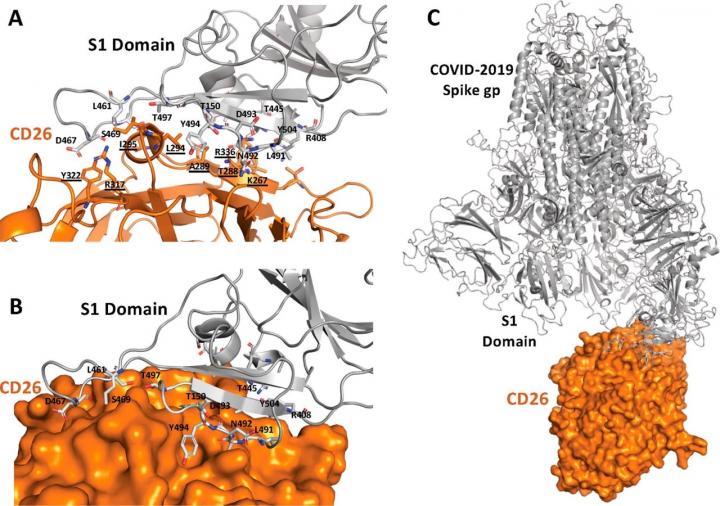
Credit: Dr. Gianluca Iacobellis
Researchers and clinicians are scrambling to find ways to combat COVID-19, including new therapeutics and eventually a vaccine. In a commentary published in the journal Diabetes Research and Clinical Practice, Miller School of Medicine professor and endocrinologist Gianluca Iacobellis, M.D., Ph.D., suggests the DPP4 enzyme presents an interesting target for further research, and DPP4 inhibitors could help some COVID-19 patients.
“We potentially have a mechanism for how the virus is getting into the body,” said Dr. Iacobellis. “And we potentially have a way we can partially inhibit that mechanism. We should consider clinical trials for DPP4 for patients who have mild or moderate COVID-19 with type 2 diabetes.”
DPP4 is found throughout the body, but its activity is only partially understood. The enzyme does play significant roles in inflammatory responses and insulin regulation. DPP4 inhibitors increase insulin and GLP-1 secretion and are commonly prescribed for people suffering from type 2 diabetes.
In the current crisis, type 2 diabetes patients are at much higher risk. Data from Wuhan and Italy have shown they have higher mortality and higher ICU admission rates. Building on previous research, conducted on earlier coronaviruses, as well as a recent paper that demonstrates DPP4 interaction with COVID-19, Dr. Iacobellis believes the enzyme may play a significant role in these outcomes by interfering with the immune response.
“The body is overreacting with this inflammatory response to the virus,” said Dr. Iacobellis. “This could be partially mediated by DPP4. The virus binds to the enzyme and the enzymatic activity of DPP4 overexpresses inflammatory cytokines, exaggerating the inflammatory response. Previous studies, of SARS and MERS, showed that, if you blocked DPP4 activity, there was a reduction in the inflammatory response. This could ameliorate the immune response to the virus.”
Dr. Iacobellis notes that clinicians will need more data before embracing DPP4 inhibitors to treat COVID-19 patients. However, he also points out that early evidence has shown these drugs reduce inflammation. He believes the enzyme’s potential role in a COVID-19 therapeutic regimen certainly deserves further study.
“Starting with diabetes patients, we should be conducting randomized studies to test whether treating those with mild or moderate symptoms improves outcomes,” said Dr. Iacobellis. “These drugs are well tolerated and may provide therapeutic benefit.”
###
Media Contact
Joanna Palmer
[email protected]
Original Source
https:/




